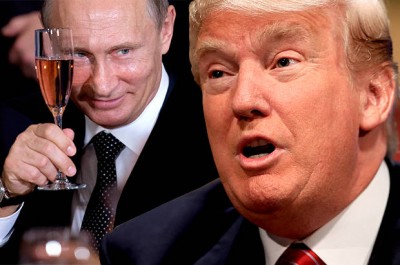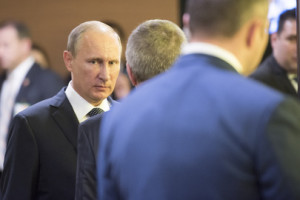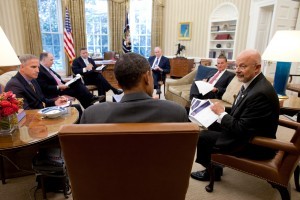The McCarthyism of Russia-gate

Congressional demands for personal and business information from several of Donald Trump’s campaign advisers demonstrate how the Russia-gate investigation continues to spill over into a new breed of McCarthyism infringing on civil liberties, including freedom of speech and freedom of association.
The original thinking had been that congressional and other investigations would concentrate on specific concerns from alleged Russian meddling in the 2016 election, such as whether a Trump intermediary somehow conveyed purloined Democratic emails to WikiLeaks for publication on the Internet.
WikiLeaks denies getting the leaked emails from Russians and the Trump campaign denies colluding with Russians, but President Obama’s intelligence chiefs claimed that Russian agents hacked the emails and then used intermediaries to get the material to WikiLeaks – although no real evidence of that has been presented publicly.

Former Trump foreign policy adviser Carter Page.
However, instead of zeroing in on that central question, the Senate investigation appears engaged in a fishing expedition looking at virtually every contact between Trump advisers and Russians, who may or may not have ties to the government. The demands are so broad that they could entrap the targets for perceived obstruction of an official investigation if some name or contact is left off, intentionally or by accident.
For instance, the Senate Intelligence Committee has demanded from ex-Trump foreign adviser Carter Page, who has extensive business dealings and personal contacts in Russia, the names and details of pretty much anyone he contacted over an 18-month period who could be a Russian official or somehow connected to a Russian business.
In a letter dated April 28, the committee’s top Republican, Richard Burr of North Carolina, and top Democrat, Mark Warner of Virginia, gave Page until May 9 to provide:
“A list of all meetings between you and any Russian official or representative of Russian business interests which took place between June 16, 2015, and January 20, 2017. For each meeting listed, please include the date, location, all individuals present, and complete copies of any notes taken by you or on your behalf.”
Meetings with Campaign
Further, the committee set a deadline of May 19 for Page to also supply:
“A list of all meetings of which you are aware between any individual with the Trump campaign and any Russian official or representative of Russian business interests which took place between June 16, 2015, and January 20, 2017. For each meeting listed please include the date, location, and all individuals present.”
By the same deadline, the committee demanded:
“All communications records, including electronic communications records such as e-mail or text messages, written correspondence, and phone records of communications which took place between June 16, 2015, and January 20, 2017, to which you and any Russian official or representative of Russian business interests was a party.
“All communications records, including electronic communications records such as e-mail or text message, written correspondence, and phone records, of communications related in any way to Russia, conducted between you and members and advisors of the Trump campaign.
“All information regarding your financial and real estate holdings related to Russia between June 16, 2015, and January 20, 2017, including those financial securities or real estate holdings which you sold or from which you divested in that time period.”
Similar information requests reportedly have been sent to other Trump campaign advisers, including Roger Stone, Paul Manafort and Michael Flynn.
Given the extent of Page’s dealings in Russia, which included having lived there for several years, the broad information demand amounts to a perjury trap because even if Page tried his best to supply all the personal, phone and email contacts, he would be sure to miss something or someone, thus setting him up for prosecution for obstructing an investigation or lying to investigators.
A FISA Warrant
Also, since the Obama administration reportedly obtained a Foreign Intelligence Surveillance Act warrant against Page last summer, the U.S. government may well have more complete records of Page’s contacts and communications than he would, thus putting him into even greater legal jeopardy for an omission.
The FISA warrant was allegedly obtained, in part, because of a speech that Page delivered in Russia on July 7, 2016, that was mildly critical of U.S. foreign policy toward the countries of the former Soviet Union. Beginning in late July, that FBI investigation then expanded into a much wider probe of people connected to Donald Trump’s presidential campaign with possible links to Russia.
In an article about the origins of the investigation of Page and other Trump advisers, The New York Times characterized Page’s July speech to the New Economic School in Moscow as critical of “American policy toward Russia in terms that echoed the position of President Vladimir V. Putin of Russia.”
The Times then quoted one line from the speech in which Page said,
“Washington and other Western capitals have impeded potential progress through their often hypocritical focus on ideas such as democratization, inequality, corruption and regime change.”
The Times article by Scott Shane, Mark Mazzetti and Adam Goldman added:
“His [Page’s] remarks accorded with Mr. Trump’s positive view of the Russian president, which had prompted speculation about what Mr. Trump saw in Mr. Putin — more commonly denounced in the United States as a ruthless, anti-Western autocrat.”
Director of National Intelligence James Clapper (right) talks with President Barack Obama in the Oval Office, with John Brennan and other national security aides present. (Photo credit: Office of Director of National Intelligence)
In reality, Page’s speech was much more nuanced than the Times presented. His central point was that the hasty transformation of the former Soviet Union from state-controlled to free market economies led to unintended consequences, including increased corruption.
“As the state remained dominant and new markets were simultaneously established following the breakup of the Soviet Union, members of these societies devised other methods and means of survival through corruption,” Page said, adding that the West was not entirely innocent of similar problems:
“These approaches mirror several corrupt tendencies at times found in Western societies. Some may be clear-cut such as the Bernard Madoff scandal in financial markets and Enron in the energy sector, while others are more subtle such as the perceived societal injustices highlighted by the Occupy Wall Street movement.”
In other words, Page’s comments fell well within a reasonable assessment of the troubles that have occurred within the countries of the former Soviet Union. Page also recognized that the West – despite its sometimes holier-than-thou attitude toward less-developed nations – has its own problems with both criminal corruption and the more subtle variety of Wall Street machinations. After all, the 2008 financial crisis stripped common citizens of both America and Europe of trillions of dollars in lost assets and costs from government bailouts.
Echoing Putin?
But note how The New York Times characterized Page’s remarks as having “echoed the position of President Vladimir V. Putin of Russia,” suggesting that Page, a former U.S. Navy officer, was somehow demonstrating disloyalty.
The Times also suggested that Page’s opinions as expressed in his speech contributed to the Obama administration’s decision to seek and obtain a FISA warrant that allowed the U.S. government to monitor his communications as a suspected foreign agent.
Normally, such intrusive government action against a citizen for expressing his opinions – whether they “echoed” the views of President Putin or not – would alarm defenders of civil liberties. However, since Page briefly served as a foreign policy adviser to Trump – and much of the civil liberties community has enlisted in the #Resistance to Trump over his presumed threats to civil liberties – there has been extraordinary silence about the McCarthyistic treatment of Page and other Trump advisers.

Russian President Vladimir Putin, following his address to the UN General Assembly on Sept. 28, 2015. (UN Photo)
Retired Lt. Gen. Michael Flynn, who served briefly as President Trump’s national security adviser, has already had a taste of how the U.S. government’s surveillance powers can entrap a citizen in a “process” crime, such as lying to investigators or obstructing justice.
On Dec. 29, 2016, several weeks before Trump’s inauguration, Flynn – while vacationing in the Dominican Republic – took a phone call from Russian Ambassador Sergey Kislyak in which they apparently discussed mounting tensions between Washington and Moscow, as U.S. intelligence officials surreptitiously listened in.
Because Flynn was not officially part of the government at the time of the call, Obama administration appointees at the Justice Department created a pretext for a criminal investigation by citing the Logan Act, a law enacted in 1799 to prohibit private citizens from negotiating with foreign adversaries but never used to convict anyone, ever. The law also is of dubious constitutionality and was surely never intended to apply to a president-elect’s advisers.
However, based on that flimsy pretext, FBI agents – with a transcript of the electronic intercept of the Kislyak-Flynn phone call in hand – tested Flynn’s memory of the conversation and found his recollections incomplete. Flynn also has come under criticism for giving a paid speech in 2015 to a dinner in Moscow honoring the tenth anniversary of the Russian television station, RT. Under mounting media and political pressure, President Trump fired Flynn.
The New McCarthyism
So, while one can legitimately criticize Flynn’s judgment, the larger civil-liberties issue surrounding the Russia-gate investigation is the prospect of criminalizing otherwise innocuous contacts with Russia and punishing American citizens for resisting the New Cold War.
Many Democrats, liberals and even some progressives appear excited over the prospect of wielding this new McCarthyism against Trump’s advisers with the hope that Russia-gate can be built up into a case for Trump’s impeachment.
But the precedents that are being set could be very dangerous for the long term. If Americans can be put under invasive FISA warrants for going abroad and criticizing U.S. policies or if intercepted phone calls can be used to test the memories of citizens during FBI interviews, many of the warnings from civil libertarians about the dangers of “war on terror” surveillance powers being applied more broadly may be coming true.

Green Party leader Jill Stein and retired Lt. General Michael Flynn attending a dinner marking the RT network’s 10-year anniversary in Moscow, December 2015, sitting at the same table as Russian President Vladimir Putin.
After receiving the sweeping congressional demands for documents and other data, Carter Page, who is an oil industry consultant with numerous foreign contacts including in Russia, responded by taking note of the reported FISA surveillance of him, writing to Senators Burr and Warner:
“I remain committed to helping the Senate Select Committee on Intelligence in any way that I can. But please note that any records I may have saved as a private citizen with limited technology capabilities will be miniscule in comparison to the full database of information which has already been collected under the direction of the Obama Administration during last year’s completely unjustified FISA warrant that targeted me for exercising my First Amendment rights, both in 2016 as well as in years prior.
“As a starting point for this latest step in the witch hunt which you suggested per the cumbersome chores defined in your … letter, I would request that you please begin by sharing [with me] the same information which you currently have … Based on the database of my personal information already collected during the Obama Administration’s domestic political intelligence operations which reportedly began at some point last year, it seems clear that many of the weighty task[s] you assigned will have already been largely completed.
“As a lone individual, I can assure you that my personal administrative capabilities pale in comparison to the clerical juggernaut represented by the numerous staff in the executive, legislative and judicial branches of the U.S. Government which have heretofore been allegedly involved in this unscrupulous surveillance for many months on end.”
Whether justified or not, the FISA surveillance of Page – and thus likely others whom he contacted – may create the basis for some kind of criminal charges against him. Other Trump advisers may be tripped up on various process crimes, such as failure to report properly under the Foreign Agents Registration Act, another law that gets enforced selectively mostly against people without political pull.
In an interview on Friday, Page told me that he was a small player who was innocent of violating any laws but who became an “obvious” target for the Obama administration’s effort to undermine the Trump campaign.
“I don’t have [political] protection and I have genuine, deep Russian connections,” he said, adding that compliance with the Senate’s demands would require him reviewing “thousands of emails and hundreds of phone calls. … It defies all logic and common sense.”
But the reality of Official Washington is that once momentum builds up around a “scandal,” someone has to get convicted of something – or all the Important People who have weighed in on the “affair” will look stupid. In Russia-gate, however, important principles about the right to dissent, the right to privacy and the right to associate freely are getting trampled.
[For more on this topic, see Consortiumnews.com’s “The Did-You-Talk-to-Russians Witch-hunt.”]
Investigative reporter Robert Parry broke many of the Iran-Contra stories for The Associated Press and Newsweek in the 1980s. You can buy his latest book, America’s Stolen Narrative, either in print here or as an e-book (from Amazon and barnesandnoble.com).


